Spotlight Front Page
Previous issue
SPOTLIGHT 2007
This
file is being compiled from articles that have come our way during the
year A.D. 2007. The first has just been sent to me by Fr Ambrose,who
found it on the NY website. I am including it as many, like me, will
enjoy renewing acquaintance with the brilliant mind of the late Bishop
Gibran. Having been written in the year that he was appointed Bishop in
Australia (1969) it has his slightly quaint style of written English
rather more noticeably than in his later writing and sermons. This
will, I think, endear it to us all the more. And the subject matter has
not dated much either....
-fr jack
From the web site of the Orthodox Research Institute:
Ancient problem, yet still fresh and relevant, stands as an unsurmountable wall in the face of the process of Orthodoxy in America. This problem is ethnic nationalism.
Nationalism is not an empty word. It is as true as the individual who is seeking himself outside himself. There is nothing authentic outside man, who is the image of God. However, the individual-wrapped up in his limited self-has the illusion that he might find his SELF where there is no real SELF; in the nation or the mass to which he belongs. The nationalistic man might be honest in putting his hope in his nation, because he is trying to establish his identity and find security for himself. Nevertheless, his point of departure is erroneous. Whenever we build the roof before the foundation, then the house is liable to fall. . .And the eyes cannot be placed in the back of our head, if we expect to move ahead and reach forward. Therefore, when we discuss NATIONALISM, we ought to pose the real problem, in order to find the real answer; The problem is the meaning of Man. And any attempt to solve this problem outside this man-perspective is condemned in advance to failure.
Then, let us put the picture within its real frame. We shall essay in this short paper to establish the fact that man is not only more important than NATIONALISM; but we shall state with assurance and certainty that Man is both the source of every meaning, and the end of all ends.
When God created Man in His image, He gave him both meaning and the force to grant meaning to every thing that is in existence. On one hand, man is not complete in himself; on the other, the world has no meaning without him. He is not complete because he receives his fullness in God; and the world was created for him, consequently, he is the meaning and the purpose of the world.
And Christ did not come to save the world, nor the nation - (what did His own nation do to Him?), but rather He came to save the Man. Thus He confirmed that which was already established by His Father: Man is the king of all creations. Not only is Man preferred to things, but also he is above even his own social ideas and political concepts. Which means he is preferred to Nationalism.
Man, as he is the meaning of the world, does not however create his own image, nor his own value. He receives it from God. Therefore, when he (Man) rejects God, he is, at the same time, rejecting his own meaning and superiority to all other creations. If Man is the meaning of the world, still God is the meaning of Man. In this perspective, Nationalism is a false shelter under which Man tries to take refuge in order wrongly to secure his being.
In Nationalism, Man loses Christ. Or rather, Christ ceases to be the prototype after which we are to become. Because, in baptism we put on Christ. And then we become the dwelling-place of the Trinity. And this gives us our meaning as human beings; consequently, if we search for meaning outside ourselves we would be denying the existence of God in us. Rather we feel the dreadful emptiness from which we try to escape; then we fall into the hades of Nationalism. Man can never be empty. If God does not fill us, then something else has to make us feel full. But are we really full when we replace Christ with Nationalism? Are we not then doing exactly that which the atheists do by denying God directly and completely? Are not we then denying our real self? What is left of us if our real Self is gone? And what is our self without Christ? Therefore, the danger of Nationalism is far more destructive to our Faith than what we normally think it can be.
One might think that I am eliminating the loyalty that one has to have for his country or nation. God forbid! I am not treating here the relationship of Christ to the State or Country. This is a topic that can be handled from another scope. All that I am saying here is that Christ comes first and before my Nationalistic feelings. The matter is one of order or preference and not of exclusion. Christ is. My nation is. Which one is first, not which one should eliminate the other. What is a Nation? It is-in a very simple expression-a group of human beings. Now, what is a human being? He is the image or the temple of God. Hence, God is first, not the Nation or the national structure.
To what am I leading? To this question, I answer: I am a Christian Orthodox. Ultimately, Christ only is the meaning of my being. Therefore, I say I am Orthodox, then I mention my nationality as a frame, a social structure, no more. I can be without a country, without nationality. But, I can never be without being. And in being, I am the image of God, not of a nation. I am the temple of God, not of a nation. I, with other beings, form a nation. So the nation acquires its existence and identity by me-and thou, and he- not from itself. A nation does not exist in-itself, for-itself. I give the nation meaning. And I draw my own meaning from God. Therefore, God- and I - we come before Nation, and we are more important than Nation.
If we, Orthodox, want to be really Orthodox, we have inevitably to consider Orthodoxy in its authentic context: Jesus the Christ. Then, you are Russian and speak Russian, I am Lebanese and I speak Arabic, but, we are both Orthodox. Then no language, no nationality, no customs, no traditions can divide the one Faith that you and I have in Christ.
When Jesus sent out His Disciples to preach the Gospel, He did not limit them to any nation nor race, nor language, nor country. "Go ye to all nations, preach to them and baptize them in the name of the Father and the Son and the Holy Spirit." This is Christianity that Christ wants. And this is the Orthodoxy that we ought to establish all over the world, especially in America. We Orthodox in this great land are scattered and dispersed like sheep without a shepherd, like lost little children in the wilderness. Empty we are of Christ, because we do not adopt Him as our unifying power. We do not want to be Christian first, and Americans second. As a matter of fact, we could not yet become Americans, because we are still hanging and
clinging to our former nationality. Two things are required of the Orthodox people in America:
1. To integrate ourselves totally and integrally in the American Nation. 2. To give up, consequently, our former concept of nationalism.
But, and before these two requirements are fulfilled, we have to be committedly aware that we are Orthodox. Because, to be a good American one has to be a good Orthodox (I am speaking as an Orthodox): but the reciprocal is not necessarily true.
What Orthodoxy, in America, needs now and right now, is that all the Orthodox become Orthodox.
Who is going to do it, and how to do it?
I leave the answer to our faithful and to our spiritual leaders.
Are they willing to perform this magnificent task?
From Word Magazine, Publication of the Antiochian Orthodox Christian Archdiocese of North America
June 1969, pp. 18, 21.
From the web site of the Orthodox Research Institute:
Nationalism, Man and Orthodoxy
By Fr. Gibran Ramlaoui (later
Archbishop of Australia and New Zealand)
St. George's Church, Cleveland, Ohio
Ancient problem, yet still fresh and relevant, stands as an unsurmountable wall in the face of the process of Orthodoxy in America. This problem is ethnic nationalism.
Nationalism is not an empty word. It is as true as the individual who is seeking himself outside himself. There is nothing authentic outside man, who is the image of God. However, the individual-wrapped up in his limited self-has the illusion that he might find his SELF where there is no real SELF; in the nation or the mass to which he belongs. The nationalistic man might be honest in putting his hope in his nation, because he is trying to establish his identity and find security for himself. Nevertheless, his point of departure is erroneous. Whenever we build the roof before the foundation, then the house is liable to fall. . .And the eyes cannot be placed in the back of our head, if we expect to move ahead and reach forward. Therefore, when we discuss NATIONALISM, we ought to pose the real problem, in order to find the real answer; The problem is the meaning of Man. And any attempt to solve this problem outside this man-perspective is condemned in advance to failure.
Then, let us put the picture within its real frame. We shall essay in this short paper to establish the fact that man is not only more important than NATIONALISM; but we shall state with assurance and certainty that Man is both the source of every meaning, and the end of all ends.
When God created Man in His image, He gave him both meaning and the force to grant meaning to every thing that is in existence. On one hand, man is not complete in himself; on the other, the world has no meaning without him. He is not complete because he receives his fullness in God; and the world was created for him, consequently, he is the meaning and the purpose of the world.
And Christ did not come to save the world, nor the nation - (what did His own nation do to Him?), but rather He came to save the Man. Thus He confirmed that which was already established by His Father: Man is the king of all creations. Not only is Man preferred to things, but also he is above even his own social ideas and political concepts. Which means he is preferred to Nationalism.
Man, as he is the meaning of the world, does not however create his own image, nor his own value. He receives it from God. Therefore, when he (Man) rejects God, he is, at the same time, rejecting his own meaning and superiority to all other creations. If Man is the meaning of the world, still God is the meaning of Man. In this perspective, Nationalism is a false shelter under which Man tries to take refuge in order wrongly to secure his being.
In Nationalism, Man loses Christ. Or rather, Christ ceases to be the prototype after which we are to become. Because, in baptism we put on Christ. And then we become the dwelling-place of the Trinity. And this gives us our meaning as human beings; consequently, if we search for meaning outside ourselves we would be denying the existence of God in us. Rather we feel the dreadful emptiness from which we try to escape; then we fall into the hades of Nationalism. Man can never be empty. If God does not fill us, then something else has to make us feel full. But are we really full when we replace Christ with Nationalism? Are we not then doing exactly that which the atheists do by denying God directly and completely? Are not we then denying our real self? What is left of us if our real Self is gone? And what is our self without Christ? Therefore, the danger of Nationalism is far more destructive to our Faith than what we normally think it can be.
One might think that I am eliminating the loyalty that one has to have for his country or nation. God forbid! I am not treating here the relationship of Christ to the State or Country. This is a topic that can be handled from another scope. All that I am saying here is that Christ comes first and before my Nationalistic feelings. The matter is one of order or preference and not of exclusion. Christ is. My nation is. Which one is first, not which one should eliminate the other. What is a Nation? It is-in a very simple expression-a group of human beings. Now, what is a human being? He is the image or the temple of God. Hence, God is first, not the Nation or the national structure.
To what am I leading? To this question, I answer: I am a Christian Orthodox. Ultimately, Christ only is the meaning of my being. Therefore, I say I am Orthodox, then I mention my nationality as a frame, a social structure, no more. I can be without a country, without nationality. But, I can never be without being. And in being, I am the image of God, not of a nation. I am the temple of God, not of a nation. I, with other beings, form a nation. So the nation acquires its existence and identity by me-and thou, and he- not from itself. A nation does not exist in-itself, for-itself. I give the nation meaning. And I draw my own meaning from God. Therefore, God- and I - we come before Nation, and we are more important than Nation.
If we, Orthodox, want to be really Orthodox, we have inevitably to consider Orthodoxy in its authentic context: Jesus the Christ. Then, you are Russian and speak Russian, I am Lebanese and I speak Arabic, but, we are both Orthodox. Then no language, no nationality, no customs, no traditions can divide the one Faith that you and I have in Christ.
When Jesus sent out His Disciples to preach the Gospel, He did not limit them to any nation nor race, nor language, nor country. "Go ye to all nations, preach to them and baptize them in the name of the Father and the Son and the Holy Spirit." This is Christianity that Christ wants. And this is the Orthodoxy that we ought to establish all over the world, especially in America. We Orthodox in this great land are scattered and dispersed like sheep without a shepherd, like lost little children in the wilderness. Empty we are of Christ, because we do not adopt Him as our unifying power. We do not want to be Christian first, and Americans second. As a matter of fact, we could not yet become Americans, because we are still hanging and
clinging to our former nationality. Two things are required of the Orthodox people in America:
1. To integrate ourselves totally and integrally in the American Nation. 2. To give up, consequently, our former concept of nationalism.
But, and before these two requirements are fulfilled, we have to be committedly aware that we are Orthodox. Because, to be a good American one has to be a good Orthodox (I am speaking as an Orthodox): but the reciprocal is not necessarily true.
What Orthodoxy, in America, needs now and right now, is that all the Orthodox become Orthodox.
Who is going to do it, and how to do it?
I leave the answer to our faithful and to our spiritual leaders.
Are they willing to perform this magnificent task?
From Word Magazine, Publication of the Antiochian Orthodox Christian Archdiocese of North America
June 1969, pp. 18, 21.
HELENA
a belated review
PREFACE
IT is reported (and I, for one, believe it)
that some few years ago a lady prominent for her hostility to the
Church returned from a visit to Palestine in
a state of exultation. "I got the real low-down at last," she told her
friends. "The whole story of the crucifixion was made up by a British
woman named Ellen. Why, the guide showed me the very place where it
happened. Even the priests admit it. They call their chapel 'the
Invention of the Cross '."
It has not been my primary aim to disillusion this famous lady but to retell an old story. This is a novel.
The novelist deals
with the experiences which excite his imagination. In this case the
experience was my desultory reading in History and Archæology.
The resulting book, of course, is neither History nor Archæology.
Where the authorities are doubtful, I have often chosen the picturesque
in preference to the plausible; I have once or twice, where they are silent,
freely invented; but there is nothing, I believe, contrary to authentic
history (save for certain wilful, obvious anachronisms which are
introduced as a literary device), and there is little
that has not some support from tradition or from early documents.
The reader may reasonably enquire: how much is true ? The Age of Constantine is strangely obscure. Most of the dates and hard facts, confidently given in the encyclopaedias, soften and dissolve on examination. The life of St. Helena begins and ends in surmise and legend. We may take it as certain that she was the mother of Constantine by Constantius Chlorus; that she was proclaimed Empress by her son; that she was in Rome in 326 when Crispus, Licinianus and Fausta were murdered; that she went soon after to Jerusalem and associated herself with building the churches at Bethlehem and Oliveto. It is almost certain that she directed excavations in which pieces of wood were found, which she and all Christendom immediately accepted as the cross on which Our Lord died; that she took part away, with many other relics, and left part at Jerusalem; that she lived some of her life at Nish, in Dalmatia, and at Treves.
Some hagiographers have fancied her at Nicaea in 325. We do not know that. We do not know where she was born or when. Britain is as likely a place as any other and British historians used always to claim her ...................................
The reader may reasonably enquire: how much is true ? The Age of Constantine is strangely obscure. Most of the dates and hard facts, confidently given in the encyclopaedias, soften and dissolve on examination. The life of St. Helena begins and ends in surmise and legend. We may take it as certain that she was the mother of Constantine by Constantius Chlorus; that she was proclaimed Empress by her son; that she was in Rome in 326 when Crispus, Licinianus and Fausta were murdered; that she went soon after to Jerusalem and associated herself with building the churches at Bethlehem and Oliveto. It is almost certain that she directed excavations in which pieces of wood were found, which she and all Christendom immediately accepted as the cross on which Our Lord died; that she took part away, with many other relics, and left part at Jerusalem; that she lived some of her life at Nish, in Dalmatia, and at Treves.
Some hagiographers have fancied her at Nicaea in 325. We do not know that. We do not know where she was born or when. Britain is as likely a place as any other and British historians used always to claim her ...................................
We do not know
that the wood Helena found is the True Cross. We need make no
difficulty about the possibility of its preservation, for the distance
in time between Helena and Our Lord is not greater than between
ourselves and King Charles I, but if we do accept its authenticity we
must, I think, allow an element of the miraculous in its discovery and
identification. We do know that most of the relics of the True Cross
now venerated in various places have a clear descent from the relic
venerated in the first half of the fourth century. It used to be
believed by the vulgar that there were enough pieces of this "true
cross" to build a battleship. In the last century a French savant,
Charles Rohault de Fleury, went to the great trouble of measuring them
all. He found a total of 4,000,000 cubic millimetres, whereas the cross
on which Our Lord suffered, would probably comprise some 178,000,000.
As far as volume goes, therefore, there is no strain on the credulity
of the faithful ........
.
.
The story is just something to be
read; in fact a legend.
Evelyn Waugh, 1950
This
should probably rate as the longest-delayed book review ever written.
The fact is that while I was still at school I picked up the Penguin
edition and read this Preface. At the time I did not appreciate
enough about the subject-matter to make the effort to read the book. It
will have been just on 50 years later that while we were visiting an
old friend not seen since schooldays I picked up a copy of the same
work. It may have been the very same copy, since if I did not
look at it first in the school library it is
very likely that I did so at my friends' home.
This time I was motivated, partly by the remarks in the Preface above, and partly by interest in Saint Helena, to read it. I missed the opportunity to borrow the Penguin copy but was able just recently to get a hard-bound edition through the National Library Interloan. We both read it and I think anyone with an interest in Church matters would enjoy it. You can tell from the Preface that the author does not swallow "legends" whole. In fact, by using the word, he is teasing his unbelieving public. In Latin the word simply means, as he says, something to be read. They are now called Lessons or Readings, to avoid the cynical nuance that "legend" has acquired. I have translated many in my work on the Divine Office, and have learned to respect them even if they are not 100% literally accurate. (Most of us realise, I think, that this is true of much of the older parts of the Old Testament.)
We have over the years read many historical novels, such as those of Mary Stewart and Mary Renault, and this compares pretty well. Unfortunately it seems not to have enjoyed the fame of his other novels; unmistakeably this will have been because the others were "pure" fiction and the implication of a historical basis was not popular then or now among the smart set whom he portrays so well in his works. I think you could do worse than to search out this book and read it; if you can't be bothered, at least you may be edified by the 2 cracks: about the "invention (i.e., Latin for "finding") of the cross" and about the millions of cubic mm, and remember them when you next hear some christian truth being carelessly dismissed by pretenders to scientific knowledge.
This time I was motivated, partly by the remarks in the Preface above, and partly by interest in Saint Helena, to read it. I missed the opportunity to borrow the Penguin copy but was able just recently to get a hard-bound edition through the National Library Interloan. We both read it and I think anyone with an interest in Church matters would enjoy it. You can tell from the Preface that the author does not swallow "legends" whole. In fact, by using the word, he is teasing his unbelieving public. In Latin the word simply means, as he says, something to be read. They are now called Lessons or Readings, to avoid the cynical nuance that "legend" has acquired. I have translated many in my work on the Divine Office, and have learned to respect them even if they are not 100% literally accurate. (Most of us realise, I think, that this is true of much of the older parts of the Old Testament.)
We have over the years read many historical novels, such as those of Mary Stewart and Mary Renault, and this compares pretty well. Unfortunately it seems not to have enjoyed the fame of his other novels; unmistakeably this will have been because the others were "pure" fiction and the implication of a historical basis was not popular then or now among the smart set whom he portrays so well in his works. I think you could do worse than to search out this book and read it; if you can't be bothered, at least you may be edified by the 2 cracks: about the "invention (i.e., Latin for "finding") of the cross" and about the millions of cubic mm, and remember them when you next hear some christian truth being carelessly dismissed by pretenders to scientific knowledge.
Fr
Jack
CHRISTCURCH CONGREGATION CELEBRATES
HAPPY RETURN OF FR VICTOR WITH HIS DAUGHTER
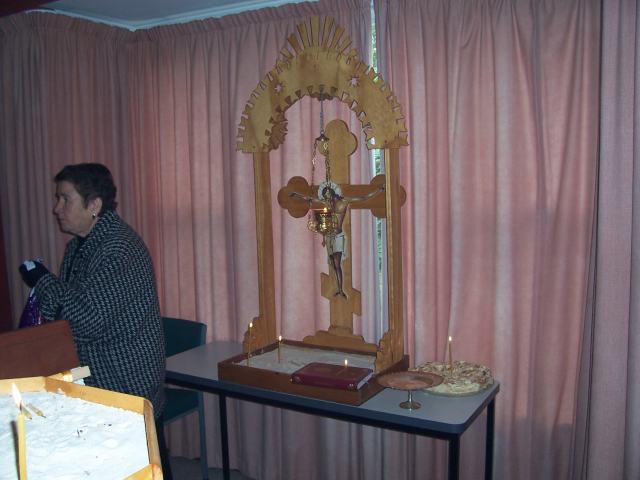
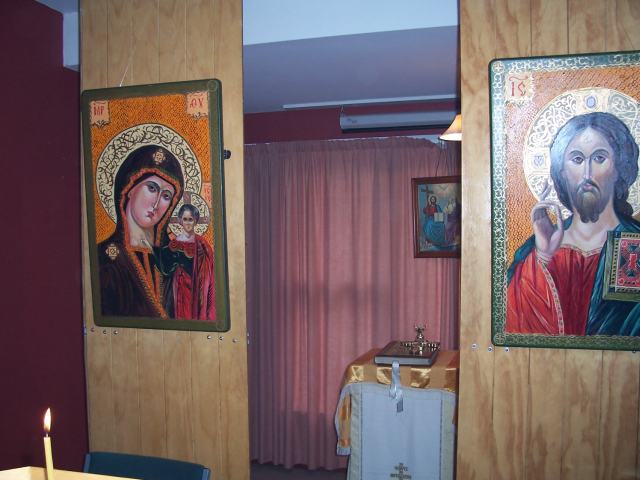
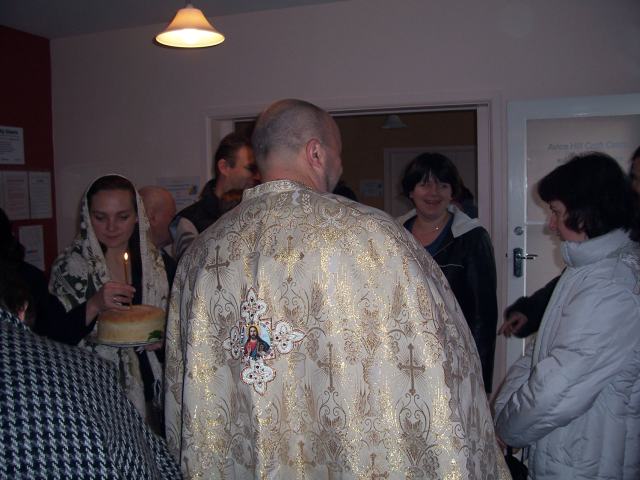
VESPERS IN CELEBRATION OF THE REUNION OF ROCOR AND THE MOSCOW PATRIARCHATE
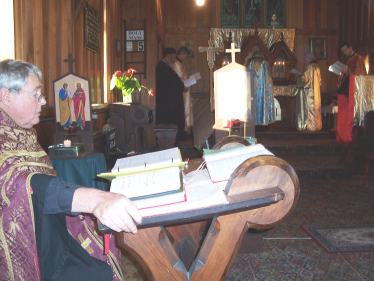
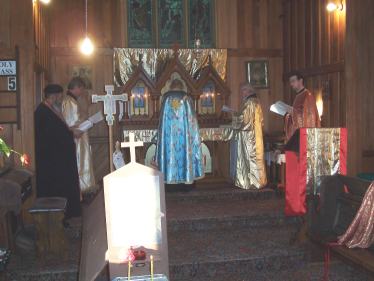
I was so
much encouraged by the response to our Vespers to celebrate
the Russian reunion. There were 14 of us, which is good for Ashley. The
Vicar of Rangiora kindly took the photos above, and I have appended a
news item from a US Romanian parish newsletter. No doubt there
will be
more striking photos in the next day or so. Everywhere except in our
secular TV and newspapers! But nothing can take away from the memory of
the spirit of our little service and the kind support of our guests.
The ChCh Russian congregations could not be with us for reasons of
time, but our Antiochian clergy, Fr Emmanuel and his wife and a singer
from the Greek Church, Fr Sourial from the Coptic Church, and some
visitors, joined with us. Towards the end of our shared tea it
became
very clear how much such joint gatherings were appreciated, and how
important it was to continue them. So addresses were collected, and Fr
Sourial invited us all to join with the Copts at Our Lady's Feast
(August 15). Arrangements were also made for Fr Jack and Julia to
contribute to a day on the christian culture of the first millenium,
organized by the ChCh Women's club to be held in a few weeks' time. All
this is good news for our hopes to base an Orthodox Resource Centre on
the Deanery at Ashley.
Thank you for your kindness in brightening up our quiet lives and making this a memorable occasion. And for your prayers, because of which our health is holding up quite well.
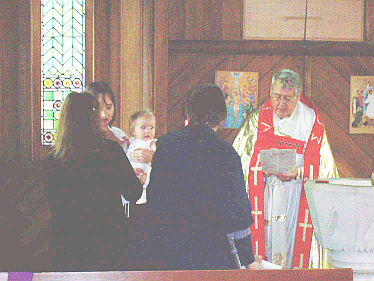
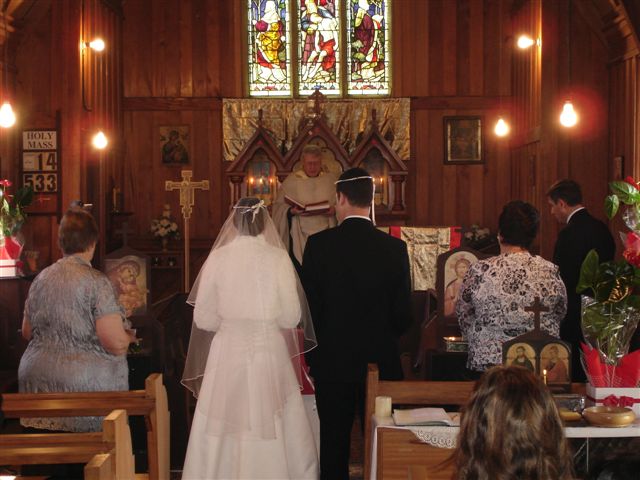
Thank you for your kindness in brightening up our quiet lives and making this a memorable occasion. And for your prayers, because of which our health is holding up quite well.
Fr Jack

Metropolitan Laurus, leader of the Russian Orthodox Church Outside of Russia, arrived in Moscow Tuesday on a mission that will reunify the Church that split in 1921, following the Bolshevik revolution.
Hundreds of thousands of Orthodox priests, monks, nuns and laity were jailed, banished and murdered by the Communist regime in Russia. The exiled branch of the Church left in 1921 after accusing the clergy in Soviet Russia of collaborating with the Communist regime.

Russian
Orthodox Church reunification in Moscow
Russian
Patriarch Alexy II, left,
and Metropolitan Laurus,
the New
York-based Leader of the Russian Orthodox Church Outside Russia,
seen during a meeting in the Danilov monastery in Moscow,
Tuesday, May 15, 2007.
seen during a meeting in the Danilov monastery in Moscow,
Tuesday, May 15, 2007.
Metropolitan Laurus, leader of the Russian Orthodox Church Outside of Russia, arrived in Moscow Tuesday on a mission that will reunify the Church that split in 1921, following the Bolshevik revolution.
Hundreds of thousands of Orthodox priests, monks, nuns and laity were jailed, banished and murdered by the Communist regime in Russia. The exiled branch of the Church left in 1921 after accusing the clergy in Soviet Russia of collaborating with the Communist regime.
The two prelates are scheduled to
sign a
document establishing
canonical ties on Thursday, May 17, 2007. The signing of the
reunification document will be held at Christ the Saviour Cathedral in
Moscow. A meeting in advance of the formal act of reunification between
Metropolitan Laurus and Russian Patriach Alexy II is underway at the
Danilov Monastery in Moscow.
Metropolitan Kirill, Chairman of the Department for External Relations
of the Moscow Patriarchate, and & Archbishop Mark of Germany are,
also, taking part in the discussions.
The Holy Synod of the Moscow Patriarchate
will
meet on May 16th at the
Patriarch's residence. The Synod will focus on matters related to the
solemn service at Christ the Saviour Cathedral.
Hundreds of pilgrims from the United States and Western
Europe
have travelled to Moscow to witness the reunification of the Church.


We have to apologize for the
delay in
uploading these photos, chosen from among many, of two family
occasions: the Baptism of Rachel and Stephen's daughter Kate at
Easter this year, and the wedding of Elisabeth
and Ryan Nielson last September. Those who know of what we
have been through in the last year will understand that some things
have been overlooked. Julia and Elisabeth stood godmothers for
Kate.